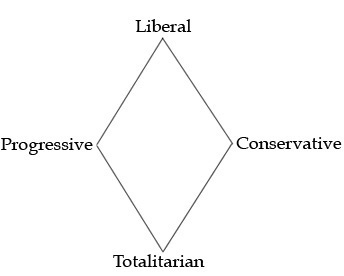Liberalism (as defined by John Locke and embodied in the Bill of Rights) is based on the hypothesis that people ought to be maximally free, with the government intervening only to the extent required to protect their freedoms against abridgment by their compatriots or by enemies abroad. This was a radical idea in the eighteenth century, when few people had much education and the general public was routinely slandered as ignorant and untrustworthy. Locke himself feared that the public was so mired in "passion and superstition" as to be apt, as Voltaire put it, to act irrationally and "speak without thinking." Sharing such qualms, many of the American founders described the newborn United States as akin to a scientific experiment. "No experiment can be more interesting than that we are now trying," wrote Thomas Jefferson in 1804, "and which we trust will end in establishing the fact, that man may be governed by reason and truth."
Liberal democracy--the form of government in which a majority can elect leaders but not constrain human rights--has survived innumerable social experiments to become the choice of more than a third of all humanity and the stated preference of most of the remainder. (Even outright despots feel obliged to pay lip service to its inevitability, if only as a distant prospect to be realized once the populace is "ready.") Yet in the United States--and, increasingly, in parts of Europe as well--the term liberal has come to mean the political Left. This has served only to cloudy the political waters. Those on the Left are free to call themselves anything they like--such as progressive, a term many have been taking up lately--but they ought not to be called liberals. Liberalism is an independent political philosophy, with no inherent connection to either the Left or the Right.
Political dynamics become a lot clearer if we replac(e) the old, one-dimensional, Left/Right political spectrum--a relic of the way delegates happened to be seated in the National Assembly circa 1789--with a two-dimensional diamond:
Such diagrams have the virtue of putting opposing philosophies in opposite positions, rather than trying to squeeze them all into a one-dimensional line. The opposite of conservatism, which cherishes practices that experience has shown to work in the past, is progressivism, which looks to the future. The opposite of liberalism is not conservatism but totalitarianism, the elevation of state power at the expense of human rights.
2.16.2010
Liberal and conservative defined, they're not what you think
Huffington Post has an excellent article by Timothy Ferris about liberal and conservative, arguing that liberal is not the opposite of conservative, but rather a position open to both conservatives and progressives (the true opposites of conservatism). I've cut out, for brevity, the parts relating to science, but you really should read the whole thing here.
Subscribe to:
Post Comments (Atom)






No comments:
Post a Comment